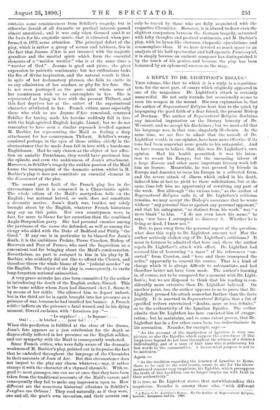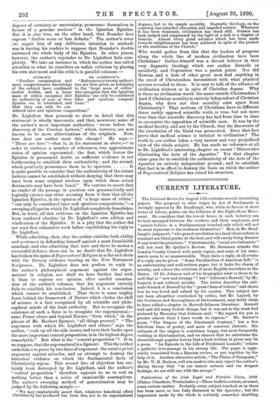A REPLY TO DR. LIGHTFOOT'S ESSAYS.* Tills volume, like that
to which it is a reply, is a republica- tion, for the most part, of essays which originally appeared in one of the magazines. Dr. Lightfoot's attack is certainly unmerciful. He not only wounds, but occasionally seems to turn his weapon in the wound. His own explanation is, that the author of Supernatural Religion hurt him to the quick by impugning the good faith of a dear friend, the present Bishop of Durham. The author of Supernatural Religion disclaims any intended imputation on the literary honesty of Dr. Westcott, and we accept his disclaimer ; hut we must add that his language was, in that case, singularly ill-chosen. At the same time, we are free to admit that the assault of Dr.
Lightfoot would, in our opinion, have been more effective if its tone had been somewhat more gentle to his antagonist. And we have reason to believe that this was Dr. Lightfoot's own
opinion. Had his health permitted, it was his inten- tion to recast his Essays ; but the unceasing labour of a large diocese and other more important literary work left him no leisure. Meanwhile, he was pressed by friends in
Europe and America to issue his Essays in a collected form, and the severe attack of illness which ended in his death, induced him at last to yield to these solicitations, but at the same time left him no opportunity of rewriting any part of the work. But although "the vicious tone," as the author of Supernatural Religion calls it, of Dr. Lightfoot's criticism remains, we may accept the Bishop's assurance that he wrote without "any personal bias as against any personal opponent," and that his antagonist, "as distinct from his work," was "a mere blank" to him. "I do not even know his name," he says, "nor have I attempted to discover it. Whether he is living or dead, I know not."
But, to pass away from the personal aspect of the question, what does this reply to Dr. Lightfoot amount to? Has the author seriously shaken any of Dr. Lightfoot's criticisms ? It must in fairness be admitted that here and there the author repels Dr. Lightfoot's attack with effect. Dr. Lightfoot had accused him of borrowing "a mass" of his references "un- sorted" from Cureton, and "here and there transposed the order," apparently to conceal the source. That is a kind of charge which it is always difficult to substantiate, and had therefore better not have been made. The author's learning is, of course, not to be compared for a moment with Dr. Light- foot's ; but we are disposed to think that his reading is con- siderably more extensive than Dr. Lightfoot believed. On another point, too, the author appears to us to prove that Dr. Lightfoot pressed his attack somewhat farther than the facts justify. It is asserted in Supernatural Religion that a list of specified writers entertained "doubts, more or less definite," as to the authenticity of the Ignatian Epistles. The author admits that Dr. Lightfoot has here convicted him of exagge- ration; but he maintains, and to some extent proves, that Dr.
Lightfoot has in a few other cases been too indiscriminate in his accusation. Neander, for example, says :—
"As the account of the martyrdom of Ignatius is very sus- picious, so also the Epistles which suppose the correctness of this suspicious legend do not bear throughout the witness of a distinct individuality, and of a man of that time who is addressing his last words to the communities. A hierarchical purpose is not to be mistaken."
Again :—
"As the tradition regarding the journey of Ignatius to Rome, there to be cast to the wild beasts, seems to me for the above- mentioned reasons very suspicious, his Epistles, which presuppose the truth of this tradition, can no longer inspire me with faith in their authenticity."
It is true, as Dr. Lightfoot states, that notwithstanding this scepticism, Neander is among those who, "with different A Reply to Dr. Lightfoot's Essays. By the Author of Supernatural Religion. London: Longmans and Co. MO.
degrees of certainty or uncertainty, pronounce themselves in favour of a genuine nucleus" in the Ignatian Epistles. But it is also true, on the other hand, that Neander does express "doubts more or leas definite " The author's error (we acquit him of any deliberate intention to mislead) was in leaving his readers to suppose that Neander's doubts embraced the whole body of the Epistles. In other places, however, the author's rejoinder to Dr. Lightfoot fails com- pletely. We take an instance in which the author has called attention to what he considers an unfair criticism by placing his own statement and his critic's in parallel columns :—
AUTHOR'S. DR. LIGH'rFOOT'S.
"Further examination and "References to twenty authori- more comprehensive knowledge ties are then given, as belonging of the subject have confirmed to the large mass of critics' earlier doubts, and a large who recognise that the Ignatian mass of critics recognise that Epistles can only be considered the authenticity of none of these later and spurious composi- Epistles can be established, and tions.' "
that they can only be con.
sidered later and spurious compositions."
Dr. Lightfoot then proceeds to show in detail that this statement is wholly inaccurate, and that, moreover, some of the author's most important authorities "wrote before the discovery of the Cureton Letters," which, however, are now known to be mere abbreviations of the originals. Now,
how does our author meet this charge ? He says :— " There are here "—that is, in his statement as above,—" in order to embrace a number of references, two approximate states of opinion represented : the first, which leaves the Epistles in permanent doubt, as sufficient evidence is not forthcoming to establish their authenticity ; and the second, which positively pronounces them to be spurious It is quite possible to consider that the authenticity of the extant Letters cannot be established without denying that there may have been some original nucleus upon which these actual documents may have been based." We venture to assert that no reader of the passage in question can grammatically and logically extract any other meaning from it than that all the Ignatian Epistles, in the opinion of "a large mass of critics," "can only be considered later and spurious compositions,"—a sweeping allegation which Dr. Lightfoot completely demolishes. But, in truth, all this criticism on the Ignatian Epistles has been rendered obsolete by Dr. Lightfoot's own edition and vindication of the Epistles. It is a pity that the author did not read that exhaustive work before republishing his reply to Dr. Lightfoot.
While admitting, then, that the author exhibits both ability and acuteness in defending himself against a most formidable assailant, and also admitting that here and there he makes a
successful defence, there can be no doubt that Dr. Lightfoot has broken the spine of Supernatural Religion in so far as it deals with the literary evidence bearing on the New Testament
Scriptures. Dr. Lightfoot does not profess to reply to the author's philosophical argument against the super- natural in religion, nor shall we here further deal with it than to express our opinion, after careful examina- tion of the author's volumes, that his argument entirely fails to establish his conclusion. Indeed, it is a conclusion which cannot be established. That there is some mighty force behind the framework of Nature which eludes the skill of science, is a fact recognised by all scientific and philo- sophical minds of the least authority. But to recognise the existence of such a force is to recognise the supernatural,— some Power above and beyond Nature, "from which," in the phrase of Mr. Herbert Spencer, "all things proceed." "The eagerness with which Dr. Lightfoot and others," says the author, "rush up all the side issues, and turn their backs upon the more important central proposition, is in the highest degree remarkable." But what is the "central proposition"? It is, we suppose, that the supernatural is a figment. This the author
undertakes to prove by two lines of argument : the usual a priori argument against miracles, and an attempt to destroy the historical evidence on which the fundamental facts of Christianity repose. This second line of objection has cer-
tainly been destroyed by Dr. Lightfoot, and the author's "central proposition" therefore appears to us to rest on nothing better than a series of unscientific assumptions. The author's sweeping method of generalisation may be judged by the following sample :—
"We may emphatically assert that, whatever beneficial effect Christianity has produced has been due, not to its supernatural
dogmas, but to its simple morality. Dogmatic theology, on the contrary, has retarded education and impeded science. Wherever it has been dominant, civilisation has stood still. Science has been judged and suppressed by the light of a text or a chapter of Genesis. Almost every great advance which has been made towards enlightenment has been achieved in spite of the protest or the anathema of the Church."
Who would gather from this that the leaders of progress
along the whole line of modern civilisation have been Christians P Galileo himself was a devout believer in that very dogmatic theology which our author discards so cavalierly, and Copernicus was a parish priest. Nor did Newton and a host of other great men find anything in
the creed of Christendom inconsistent with what physical science revealed to them. It is easy to talk of the advance of civilisation without or in spite of Christian dogma. Why is there no civilisation worth the name outside Christendom ?
And if Christian morality is entirely independent of Christian dogma, why does not that morality exist apart from Christianity ? That sections of Christians have at different times rashly opposed scientific truth, is true, but not more true than that scientific discovery has had from time to time to encounter the opposition of scientific men. It was by the medical faculty, and not by the Church, that the discoverer of the circulation of the blood was persecuted. Does that fact prove that medical science is inimical to civilisation ? The truth is, our author takes a very narrow and very prejudiced view of the whole subject. He has made no reference at all
to Dr. Lightfoot's interesting chapter on recent "Discoveries illustrating the Acts of the Apostles." Yet that chapter alone goes far to establish the authenticity of the Acts of the Apostles on entirely independent ground ; and to establish that fact is in effect to destroy the basis on which the author of Supernatural Religion has raised his structure.



































 Previous page
Previous page